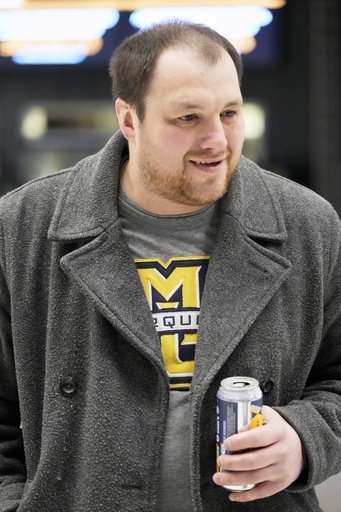MILWAUKEE — Missy Vraney and Kristin Westphal are not Marquette University alumni, nor do they have familial connections to the school. However, their family tradition of attending Golden Eagles basketball matches spans several generations. Vraney reflects on how their father would take turns bringing them whenever their uncle was unavailable to go.
Now, they continue to support the school, but in a different way—by purchasing Marquette Golden Ale instead of covering tuition. Every time they head to the Fiserv Forum, they enjoy this officially licensed craft beer, which was introduced through a partnership with Third Space Brewing, a local Milwaukee brewery. This is the inaugural season for the Marquette Golden Ale, which is available at sporting events, Third Space locations, and local grocery stores. Notably, 15% of the profits from these sales are returned to Marquette.
“The response has been overwhelmingly positive,” said Andy Gehl, co-founder and president of Third Space Brewing. “Fans enjoy drinking beer that proudly displays their school or team logo. It’s not just about the beer; they also want to support local businesses that contribute to their university.”
This trend of colleges forging partnerships in the craft beer sector has been gaining traction. Learfield, which manages sports sponsorships for over 160 universities, reports that 93 schools established licensing agreements for alcoholic beverages within the first half of the current fiscal year—a striking increase of 57.6% compared to the previous year, which saw 59 such deals.
The increase in colleges forming partnerships with craft breweries has been notable; the number of schools involved in such arrangements has risen from 16 to 36. Cory Moss, Learfield’s president of brand management and marketing, admits he would have been surprised by this growth just a few years ago. However, he started noticing a heightened interest from universities and local breweries eager to collaborate.
“When educational institutions rallied behind the initiative and the craft industry committed to it, that’s when momentum built,” said Moss. “The ensuing growth has been remarkable.”
The college sports scene has seen a substantial shift, especially considering that many institutions previously did not sell alcohol at athletic events. Notably, the Southeastern Conference only approved the sale of beer and wine at sporting events in 2019, prompting schools like Tennessee to partner with local breweries to offer exclusive beers during their events.
Tennessee, for example, teamed up with Yee-Haw Brewing Company last summer to introduce Vol Lager as the official craft beer of the Volunteers. “For distributors and companies, being able to sell beer within the venue is vital; it helps develop a brand affinity,” explained Alicia Longworth, Tennessee’s deputy athletics director and chief marketing officer. “This synergy benefitted both the brewery and the university.”
During the previous fall season, Tennessee sold 16 beer varieties at Neyland Stadium, with Vol Lager consistently ranking among the top four. Gehl mentioned that Third Space Brewing sold over 3,000 “case equivalents” of their product within the first three months of their partnership with Marquette. The brewery has also started selling merchandise featuring both its and Marquette’s logos.
Other universities are enjoying similar successes with their unique beers. According to Learfield, sales of college-licensed alcoholic beverages reached $7.5 million during the 2024 fiscal year. Different institutions allocate the proceeds in various ways, some directing them straight to the schools, while others use it to support collectives. For instance, Cincinnati’s Cincy Reigns collective partnered with Rhinegeist to sell Cincy Light at Bearcats events and in nearby establishments.
“Early feedback indicated that fans were flocking to bars and restaurants just to enjoy Cincy Light,” shared Brian Fox, chair of the Cincy Reigns board. “One suburban TGI Friday’s reported fans arrived solely for the chance to sip Cincy Light, decked out in University of Cincinnati gear.”
Moss emphasized that these partnerships necessitate collaboration between schools and breweries, asserting that creating a successful product requires more than just slapping a logo on a beer can. Schools usually seek out local breweries for these collaborations. For example, Yee-Haw Brewery was founded by a law school graduate from Tennessee, while Third Space is located a mere 1.5 miles from Marquette’s campus.
Ultimately, the key to the success of these signature beers is simple. Joe Dobrogowski of Germantown, Wisconsin, who was celebrating with a Marquette Golden Ale at a recent game, stated, “If it didn’t taste good, I wouldn’t drink it. That’s the most important aspect, and the fact that it benefits the school is just a nice bonus.”


